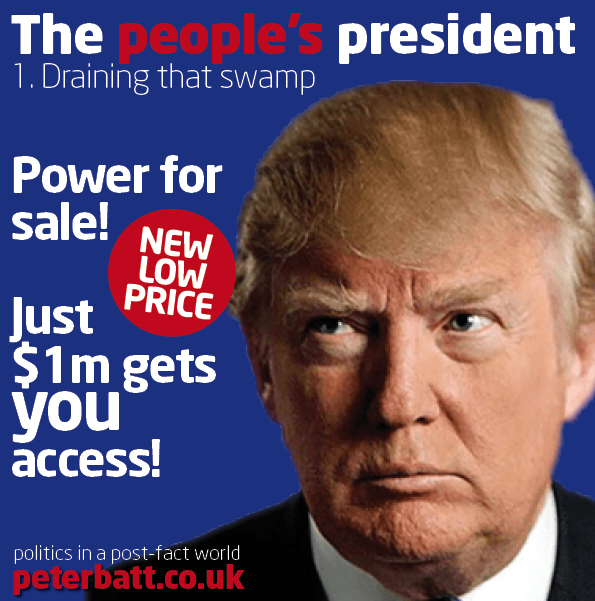
Listen to much of the so-called ‘alt-media’, and one could be forgiven for thinking that four-times bankrupt-come-billionaire, US President-elect Donald Trump, really is going to give the establishment what for.
While much of the corporate media is transfixed by the horrors that await, other leading commentators, notably Infowar’s Alex Jones, and Max Keiser and Stacy Herbert of Keiser Report fame, have delighted in America’s exciting new departure.
But the events since the 8 November election do little to suggest that Trump really will wield the sword of justice to cut the bankers, corporations and special interests down to size.
Instead, he intends to reduce bank regulation and let Wall Street do its thing unhindered, while offering tax cuts that will mainly benefit the wealthy.
Trump was going to drain the swamp of corruption. But, it turns out, he’s turned his inauguration into exactly the sort of money-making opportunity that cries out shady deals. After all, anyone who contributes a sum of six figures or more to his inauguration committee will have special access to the new president.
In fact, rather than representing some uprising for the common man, Trump is beginning to look like he’s more at ease among the corporate establishment than many of his predecessors.
And where Trump has talked their language – such as bringing all those factory jobs back from China and elsewhere – the process is vague. For instance, Making America Great Again involves abandoning the albeit dodgy free-trade agreements and replacing them with the results of his wheeler-dealering magic.
The problem is twofold: not only are his policy positions, such as they are, undefined, but then there’s his changeable temperament to contend with as well.
For instance, does Trump have the nouse to handle globally-interconnected issues, such as the mammoth debt China has racked up over the last decade, with the sensitivity that would avoid economic catastrophe in today’s debt-saturated world economy? Well, we’ll soon find out.
And it’s Trump’s core, blue-collar support that will likely suffer most if he gets it wrong. As Greece’s former finance minister Yanis Varoufakis writes:
Trump’s plan for helping those left behind since the 1970s, to the extent that one is discernible, seems to turn on two axes: a domestic stimulus and bilateral deal-making under the threat of tariffs and quotas. But if he plays hardball with China, pushing the Chinese to revalue the renminbi and employing threats of tariffs and the like, he may well end up pricking the bubble of China’s private debt – unleashing a deluge of nasty consequences that would overwhelm any domestic stimulus he introduces.
It’s difficult to find convincing signs of that sensitivity in anything Trump has done, outside his acceptance speech comment that he would govern for all Americans. And, still, there’s the uncertainty as to what his policy pronouncements really mean.
For instance, the markets have been all excited about the prospect of Trump borrowing shedloads of money – between $1trn and $2trn – to resuscitate America’s crumbling infrastructure. Yet there are significant doubts that his ‘proposals’ really amount to the stimulus package many are hoping for.
Even the certainties about the death of Obamacare, a policy he routinely pilloried during the hustings, are no longer certain after he suggested that parts might be retained.
These outward signs of concilliation have allowed some, such as Max Keiser, to suggest Trump is really a pragmatist at heart and will abandon policies that make no long-term sense – such as ditching renewables and pulling out of all climate change initiatives and research.
Such a touching faith in Trump’s better nature is not, however, supported by his nominees for government positions, nor the post-truth universe he currently seems to inhabit – check out his fact-free comments about winning the popular vote, for instance.
Even if his own better nature does rise to the fore, the people he is surrounding himself with are framed by a narrow, right-wing agenda. Here’s Trump’s nominees so far:
- Goldman Sachs veteran Steven Mnuchin as Treasury secretary. No departure from the establishment there, then.
- Combative conspiracy theorist Steve Bannon, the executive chairman of the populist right-wing website Breitbart News, as his chief strategist.
- Straight-talking retired army veteran Lt Gen Michael Flynn, as national security adviser. During the spring, Flynn supported Trump’s proposed ban on all Muslims entering the US.
- Alabama Sen Jeff Sessions, as attorney general. Such is Sessions’ history of making racist remarks and showing contempt for civil and voting rights that even his nomination as a federal judge by Ronald Reagan was rejected by the Senate.
- Betsy DeVos, as education secretary. DeVos is a big advocate of ‘school choice’ – in which scholarships and tax incentives are offered to fund places in non-state schools. Among the many to have attacked the nomination was National Education Association president Lily Eskelsen Garcia in The Guardian, who claimed she pushes a “corporate agenda to privatise, de-professionalise and impose cookie-cutter solutions to public education”.
- South Carolina governor Nikki Haley, as US ambassador to the United Nations. Earlier in the campaign, Haley was considered a possible secretary of state, but lost her chance when she criticised Trump for his failure to condemn the white supremacy movement.
- Tom Price, an advocate of privatising Medicare and ‘one-man death panel for Obamacare’, as head of Health & Human Services chief.
- Billionaire, turnaround specialist and ‘king of bankruptcy’ Wilbur Ross, as commerce secretary.
- Elaine Chao, as Trump’s transportation secretary. Despite serving as Labor Department head under George W Bush, Chao was no doubt gratified to be labelled Trump’s ‘most normal choice yet’ by vox.com.
The big position that Trump is still to announce is his nominee for State Department. However, his cordial restaurant meeting with Mitt Romney on Tuesday evening might suggest that the 2012 Republican presidential candidate has the edge over his two main competitors, Sen Bob Corker and the retired, ‘scandal-scarred’ General David Petraeus.
All in all, this looks a robust team, keen to roll back the state once again and give yet more scope to the private sector.
The problem is that, though big government may not be the answer, this most neoliberal of strategies doesn’t often work. Instead, rather than spreading the prosperity around, it has a track-record of increasing inequalities of wealth and power – and this at a time when many Americans are already on or close to the breadline.
Indeed, in its Global Wealth Report 2015, Credit Suisse said that holding just ten dollars in nett wealth would make you richer than a quarter of all Americans. Could Trump be set to attack the safety net that many rely on just to get by? It sounds like we’ll be revisiting the trickle-down effect all over again.
Reassuringly, Trump has said he won’t let Americans “die in the streets” due to poverty, homelessness or hunger. But the very real danger is surely that, beyond the far-right, many of those who voted for him could soon be much worse off than they are now.
If that comes to pass, then many Americans will feel bitterly betrayed. And, given his influence beyond US shores, they’re unlikely to be alone.
